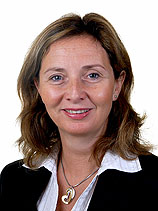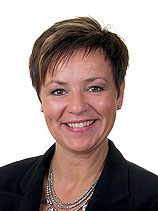Very positive
Representatives to the Norwegian Parliament applaud the Research Council’s grant scheme to promote women in research, but will not guarantee allocations for the project.

The Research Council’s new grant scheme to recruit women, known as BALANSE (“balance”), is getting accolades from representatives to the Norwegian Parliament.
“It’s a very positive initiative,” says Gunn Karin Gjul, chair of the Norwegian Parliament’s Standing Committee for Family and Cultural Affairs and representative for the Labour Party.
The ambitious grant scheme has a long history. In 2003, a project to earmark academic positions for women was stopped by a ruling of the EFTA Surveillance Authority. This is the Research Council’s most ambitious initiative on women since that time. The project was approved by the Executive Board of the Research Council in November 2010, but the Research Council is dependent on funding from the Ministry of Education and Research to implement its plans.
“Ever since Norway was prohibited from continuing its quota system due to the EFTA ruling in 2003, I have missed measures to recruit women in academia. This is why I think the Research Council’s initiative is so exciting,” says Gjul. She finds the breadth of the grant scheme to be most interesting.
“It is the breadth of the initiative that is so great. The Research Council plans to implement several measures simultaneously. It is wise to focus both on giving women a boost up and on subject areas that traditionally have been difficult to recruit women to. It is clear that there is a kind of glass ceiling in academia that the women hit their heads against, whether this is because their qualifications are not recognized or because they don’t apply for upper-level positions,” says Gjul, who emphasizes that she cannot guarantee additional funding for the project.
“I cannot promise any funding. As the chair of the Standing Committee for Family and Cultural Affairs I work vis-à-vis another ministry, not with the Ministry of Education of Research. But I think it is an important initiative and I hope it is followed up and that the Research Council uses the funds it has set aside for it,” she says.
Three-part initiative
The Research Council’s new initiative consists of three main parts. The first is a grant scheme to assist women with obtaining qualifications beyond the post-doctoral level. This scheme will also be used to stimulate mobility between academia and the business sector, as well as across national borders. The second part is designed to increase the proportion of women in research management and to strengthen research directors’ expertise in gender-equality leadership, regardless of their gender. The third part will enhance insight into the mechanisms that influence women’s decision to drop out of the research sector rather than pursue upper-level positions. The challenge related to temporary positions will be one of several issues explored.
Centre Party supportive
Anne Tingelstad Wøien, the Centre Party’s representative on the Standing Committee for Education, Research and Church Affairs, is pleased about the Research Council’s initiative on women.

“I think it is very positive. We need to ensure there are women at the highest levels of research. In this way we can help to create more female role models,” says Tingelstad Wøien. She adds that she thinks it is essential to have an initiative to recruit women to top-level positions at this time since a growing number of girls and women are choosing to pursue a higher education.
“Would you support an additional allocation to the Research Council so it can implement the project as planned?”
“I cannot promise more funding here and now. The Centre Party does not make allocations on its own. The matter must be addressed in the context of the budget. But the Research Council must set its own priorities. I suppose in any case that the Research Council will give priority to such an important project in its own budgets,” says Tingelstad Wøien.
Will address the matter
“I really believe in this project,” says Aksel Hagen, representative for the Socialist Left Party on the Standing Committee for Education, Research and Church Affairs.
“We had hoped Norway would win the case with the EFTA Surveillance Authority at that time, but the ruling went against us. In spite of this, it is an important political and ethical principle for us to help women to move up and forward,” says Hagen.
He believes the Research Council’s initiative on women will have extremely beneficial ripple effects.

“I think this project will also help to enhance the quality of research in Norway. The research community must have a broad recruitment base and be relevant for society. Research must reflect our society to the extent possible. It is vital that we incorporate women’s perspectives and experiences into research,” says Hagen.
He adds that he is uncertain whether the Research Council’s initiative is comprehensive enough to successfully reach its goals.
“I’m not sure whether this is enough to succeed. The grant scheme must be assessed along the way to determine whether it has sufficient clout. But at least the Research Council has now established the initiative, and so it is important that the research institutions also do what it can to make it work.”
“Would you support an additional allocation for the project?”
“I cannot promise funding for the project here and now, but we will address the matter in our budget discussions. If these measures do not have adequate impact, we politicians will no doubt need to allocate more funding,” Hagen concludes.
Cautions against micromanaging
The Conservative Party is also supportive of the project, but it is sceptical about allocating funding to individual projects under the Research Council.

“This seems like a reasonable initiative by the Research Council. The Conservative Party believes in principle that all segments of society function better when there is gender balance. We also believe it is necessary to establish targeted measures in areas where there are challenges, whether it is the women or the men who are in the minority,” says Henning Warloe, the Conservative Party’s representative on the Standing Committee for Education, Research and Church Affairs.
Warloe emphasizes that his party does not typically allocate funding to individual projects.
“In the Conservative Party we generally take a critical view of a lot of earmarking of funds. The politicians already place many requirements on the Research Council, but since this is the Research Council’s own initiative I heartily welcome it. In this case I would be less sceptical,” says Warloe.
Warloe says that he thinks NOK 20 million is a reasonable annual budget, but that he is uncertain whether he would support increasing the budget to NOK 50 million annually as the Research Council has proposed.
“NOK 50 million sounds like a lot. This sector also has many other challenges, and this money would benefit other areas as well. By the same token, the amount is a small proportion of the Research Council’s overall budget,” says Warloe.
Not promising anything
Marianne Aasen, chair of the Standing Committee for Education, Research and Church Affairs, does not want to comment on the matter. She says via her adviser Thomas Strandberg that even though the Labour Party believes that gender equality is important, they consider this to be a budget issue that needs to be addressed in the ordinary budget negotiations. As a result, they do not want to comment on the situation right now, but would rather take a position on the matter when the budget is deliberated.
Translated by Connie Stultz.
The Research Council's Initiative on Gender Balance in Senior Positions and Research Management (BALANSE) has its own webpages, which were launched in March 2011.
